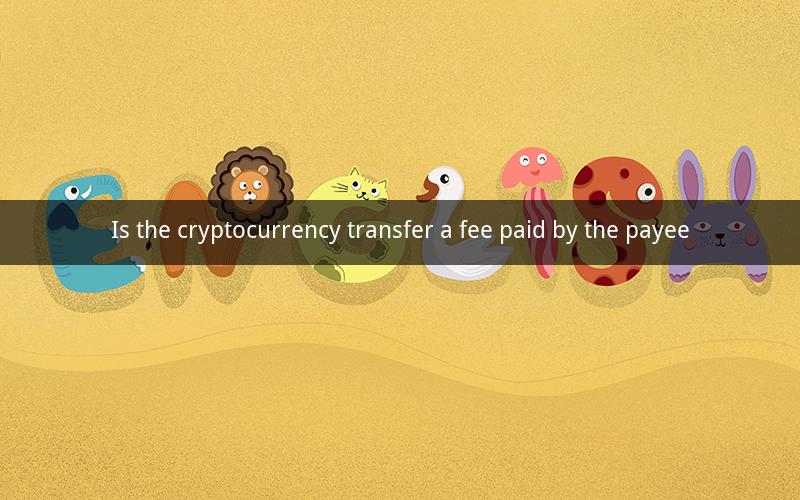
Cryptocurrency Transfer Fees: Who Pays and Why?
Table of Contents
1. Introduction to Cryptocurrency Transfer Fees
2. Understanding the Nature of Cryptocurrency Transactions
3. The Role of Miners in Cryptocurrency Networks
4. How Fees Are Calculated in Cryptocurrency Networks
5. Factors Influencing Cryptocurrency Transfer Fees
6. The Impact of Fees on Transaction Speed
7. The Role of Exchanges and Wallets in Fee Management
8. The Debate on Fee Allocation in Cryptocurrency Networks
9. Future Trends in Cryptocurrency Transfer Fees
10. Conclusion
1. Introduction to Cryptocurrency Transfer Fees
Cryptocurrency transfers involve fees, which are a crucial aspect of the network's operation. However, the question of who pays these fees remains a topic of debate. This article delves into the intricacies of cryptocurrency transfer fees, examining the roles of various participants in the process.
2. Understanding the Nature of Cryptocurrency Transactions
Cryptocurrency transactions are recorded on a decentralized ledger known as a blockchain. These transactions are grouped into blocks and added to the blockchain in a chronological order. The process of adding new blocks to the blockchain is called mining, and it requires computational power.
3. The Role of Miners in Cryptocurrency Networks
Miners are individuals or entities that validate and secure cryptocurrency transactions. They use their computational power to solve complex mathematical puzzles, which are essential for adding new blocks to the blockchain. In return for their efforts, miners are rewarded with cryptocurrency, typically in the form of transaction fees.
4. How Fees Are Calculated in Cryptocurrency Networks
Fees are calculated based on various factors, including the size of the transaction and the current demand for network resources. In most networks, the fee is a small amount of cryptocurrency that the sender pays to the miner. The higher the fee, the more likely the transaction is to be processed quickly.
5. Factors Influencing Cryptocurrency Transfer Fees
Several factors influence the fees associated with cryptocurrency transfers:
- Transaction Size: Larger transactions typically incur higher fees.
- Network Congestion: During peak times, when many transactions are being processed, fees can increase.
- Transaction Priority: Higher fees can ensure faster processing and confirmation of transactions.
6. The Impact of Fees on Transaction Speed
Fees directly impact the speed of cryptocurrency transactions. Higher fees can lead to faster confirmations, as miners prioritize transactions with higher fees. Conversely, lower fees may result in longer wait times for transaction confirmations.
7. The Role of Exchanges and Wallets in Fee Management
Exchanges and wallets often play a role in managing fees for their users. They may automatically set the fees based on the current network conditions or allow users to choose their desired fee level. Some platforms also offer fee estimation tools to help users understand the cost of their transactions.
8. The Debate on Fee Allocation in Cryptocurrency Networks
The debate over fee allocation centers on whether the sender, receiver, or both should pay the fees. Proponents of sender-pays fees argue that it aligns with the principles of decentralization and ensures that miners are rewarded for their efforts. On the other hand, receiver-pays fees can be more user-friendly, as it eliminates the need for the sender to understand or manage fees.
9. Future Trends in Cryptocurrency Transfer Fees
The future of cryptocurrency transfer fees may be influenced by several factors:
- Technological Advancements: Innovations in blockchain technology could lead to more efficient fee structures.
- Regulatory Changes: Government regulations may impact how fees are calculated and allocated.
- Market Dynamics: The supply and demand for cryptocurrency may affect fee levels.
10. Conclusion
Cryptocurrency transfer fees are an integral part of the network's operation, influencing transaction speed and miner rewards. Understanding the factors that affect fees and the roles of various participants in the process is essential for users to make informed decisions about their transactions.
Related Questions and Answers
1. Q: Why do cryptocurrency transactions require fees?
A: Fees are required to incentivize miners to validate and secure transactions, ensuring the integrity of the network.
2. Q: Can cryptocurrency transactions be processed without fees?
A: Yes, but transactions without fees may take longer to be confirmed as miners prioritize those with higher fees.
3. Q: How can I estimate the fee for a cryptocurrency transaction?
A: Many wallets and exchanges offer fee estimation tools based on current network conditions.
4. Q: Are there any cryptocurrencies with zero transaction fees?
A: Some cryptocurrencies, like Dash and PIVX, have implemented mechanisms to reduce or eliminate transaction fees.
5. Q: Can I avoid paying fees by using a third-party service?
A: Some third-party services may offer lower fees, but they may also charge additional costs for their services.
6. Q: How do fees compare between different cryptocurrencies?
A: Fees can vary significantly between different cryptocurrencies, depending on network congestion and transaction size.
7. Q: Can I send a cryptocurrency transaction with insufficient fees?
A: Yes, but such transactions may be delayed or not processed at all.
8. Q: What happens if I send a cryptocurrency transaction with more fees than required?
A: The excess fees will typically be returned to the sender's wallet.
9. Q: Can miners choose which transactions to process based on fees?
A: Yes, miners have the discretion to prioritize transactions with higher fees.
10. Q: How do fees affect the overall cost of using cryptocurrency?
A: Fees can significantly impact the cost of using cryptocurrency, especially for large or urgent transactions.